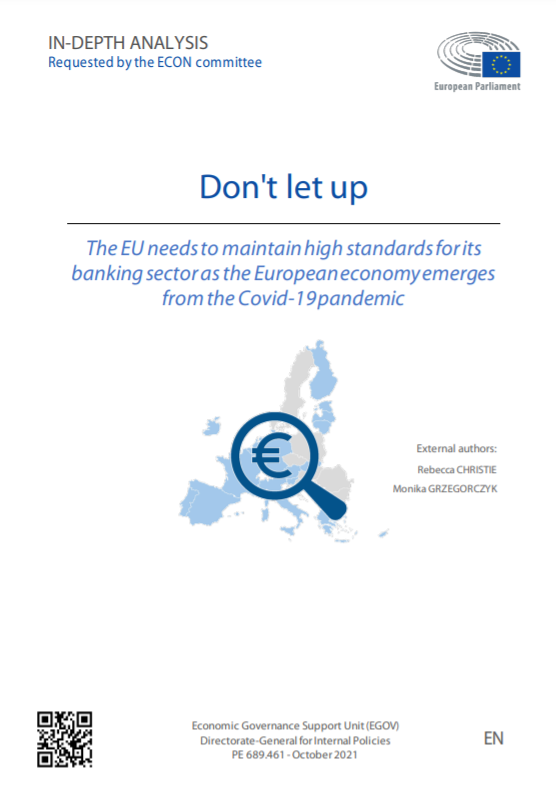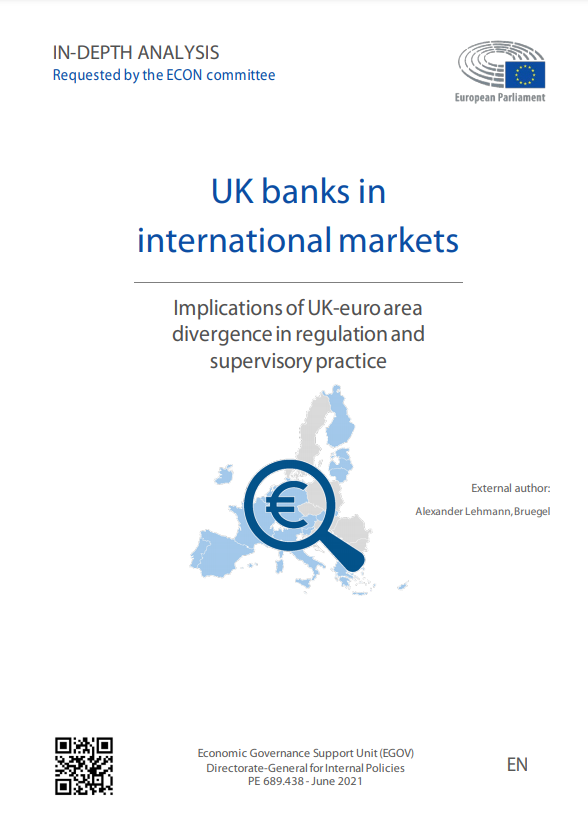Opinion
The EU’s Opportunity to Turn Its Markets Toward the Future
Meeting the fiscal demands of COVID-19 will require the European Union to borrow on capital markets more than ever, and for European pension funds and households to look more widely for ways to build their nest eggs safely. The EU should take the challenges of the pandemic and Brexit as a chance to get its financial infrastructure house in order.
This article is based on a version first published in BRINK news.

The EU is newly looking to harness financial markets for good on its recovery path out of the COVID-19-caused recession. Germany’s U-turn from abhorring public debt to ramping it up for a good cause has given momentum to a continental shift that may lead, for the first time, to joint EU borrowing at scale. EU leaders now are considering a sizeable aid fund that would allow the 27 member states to borrow jointly, harnessing their collective reputations to raise private-sector money for the recovery effort.
Leaders will use a mid-July summit to find common ground on how to move ahead. EU Council President Charles Michel made the case that acting collectively, and issuing aid money as grants rather than loans where possible, will strengthen the single market and broader economy by not weighing down individual member states with ever more debt. The EU needs to make a deal on its €1.1 trillion seven-year budget as well a proposed €750 billion recovery fund.
To make the most of the moment, they should also push for a true commitment to improving Europe’s capital markets. For too long, policymakers have let popular discomfort with trading and “speculators” bog down efforts to make European markets function more smoothly. Politicians have made soothing noises about “capital markets union” as sympathetic slogan, without delivering a policy mandate that would lead to real changes. Now the all-hands-on-deck response to the novel coronavirus threatens to sideline the project once again.
Banking measures so far have focused on making sure the financial sector not only survives the current downturn but also can actively support households and businesses. The European Commission proposed a banking package in April, adopted in June, that grants banks considerable flexibility in lending standards and capital requirements. During the last financial crisis, regulators forced banks to raise capital so they would be better prepared for future shocks. Now that risk-bearing capacity is called to the fore.
Longer-term improvements remain stuck, just as they were before COVID hit. The euro area made great strides from 2012-2015, putting in place two of the three pillars of its banking union plan. The European Central Bank is now a joint supervisor for all banks that use the common currency, and the Single Resolution Board is up and running to coordinate how failing banks are handled across the area. On joint deposit insurance, however, political talks are still in very early stages, and national systems prevail.
Likewise, capital markets union remains firmly in planning territory. An initial push led to a few improvements, but cross-border financial activity remains limited by fragmentation and a patchwork of national rules. April’s EU Roadmap for Recovery notes that the financial sector will “play an important role” and it calls for completing the banking union and making progress on capital markets union. The political will to show optimism contrasts with the political instinct to play defense at the negotiating table.
Britain’s coming departure from the EU’s single market means the financial environment is changing regardless. Thanks to years of preparation, the financial industry has minimised the chance of operational upheaval when the regulatory borders go up. However, these measures come at a cost. As long as the EU does not have mature markets of its own, it will have to pay the additional fees and legal costs of doing business in multiple jurisdictions more broadly than if there were less fragmentation at home.
Much of the emphasis on adjusting to single-market life without London has been on what the EU is losing. The City, as the U.K.-based financial industry refers to itself, is a global hub with a large and experienced workforce. The EU-27 has amassed wealth but has never had the same comfort with financial market activity, and until now it has been happy to let London manage the operational flow. With Britain on its way out, the EU has an opportunity to take the lead. Instead of a loss, Brexit can serve as a catalyst.
Aging populations provide compelling reason to move forward during this adjustment period. In June, the European Commission’s High Level Forum on the Capital Markets Union found that the countries with the best funded pension systems have the best markets. This is important for households, not just governments. When markets work better, there is more money to pay for the things that society needs.
Governments and taxpayers cannot go it alone. Countries need a wider range of products for their pension funds, insurers and individual investors to choose from. To quote the HLF’s report: “National capital markets are simply too small to attract global investors and cover the massive financing needs of economic re-adjustment.” To spur investment across borders, the task force called for measures ranging from standardising disclosures to clearing up tax treatment of retail investment funds. Its recommendations would give more crisis-fighting powers to the European Securities and Markets Authority, and make equity financing more appealing to Europe’s small businesses and to those who invest in them.
The tremendous fiscal demands of COVID-19 mean the EU needs to look further than expanding and linking its stock markets. The EU can do more to improve its bond markets too, to make them more attractive to global investors.
Countries need to sell bonds worldwide, not just to local banks and investment funds, to raise the money needed to counteract the pandemic-caused recessions. The euro area has spent considerable time and effort trying to break the financial dependencies between banks and sovereigns so that a crisis in one sector does not create an immediate meltdown in the other.
This means improving confidence in the euro. The most effective way to do that would be to complete the banking union, as leaders periodically acknowledge. So far the common currency has set up strong joint supervision and an emerging resolution, but deposit insurance remains tied to national finances. With a true deposit insurance programme, customers across the 19-nation currency union could have confidence that their bank accounts are protected equally, regardless of the national circumstances of the country where they keep their savings. This in turn would reassure global investors that the euro is a true joint currency, not an overlay on top of otherwise individual financial systems.
Political debate has concentrated on reducing risks, and ensuring banks deal with any existing bad loans on their books, before cross-border safeguards increase. Risk sharing needs to be the next step. To quote Bank of Greece Governor Yannis Stournaras, “it is only in this way that we can transform, what is in effect today in the eurozone, a non-cooperative zero-sum game into a cooperative, win-win one.”
The EU needs its markets more than ever. European governments and taxpayers need private investors to join in the recovery building effort. It will be tempting to postpone long-term changes until the crisis is more in hand. But those instincts lead to paralysis and inertia, the opposite of the momentum needed to boost growth. By getting started with changes now, the EU will be able to bring in money off the sidelines when it is most sorely needed.
Republishing and referencing
Bruegel considers itself a public good and takes no institutional standpoint.
Due to copyright agreements we ask that you kindly email request to republish opinions that have appeared in print to [email protected].




















